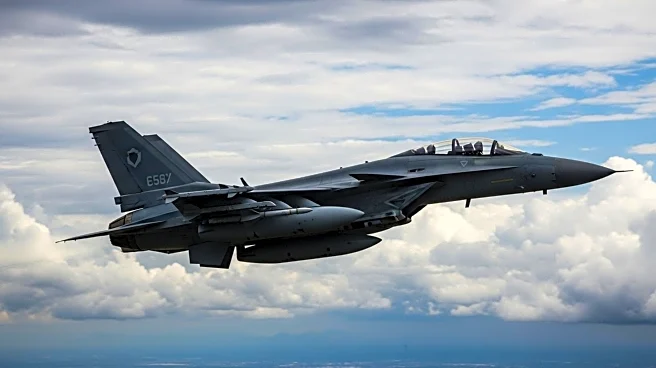What's Happening?
Russia has agreed to assist China in equipping and training an airborne battalion, according to leaked documents reviewed by the Royal United Services Institute (RUSI). The agreement involves Russia selling military equipment to China's People’s Liberation Army (PLA), including assault vehicles and anti-tank guns. Additionally, Russia will train a battalion of Chinese paratroopers to operate these vehicles. The documents, leaked by the Black Moon hacktivist group, also indicate that Russia will transfer technology to China, enabling it to produce similar weapons. This development highlights the strengthening military partnership between Russia and China, which has been growing over the past decade. The collaboration is seen as a strategic move by both nations to bolster their military capabilities, particularly in areas where China seeks to enhance its air maneuver capabilities.
Why It's Important?
The deepening military ties between Russia and China have significant implications for global geopolitics, particularly concerning U.S. interests. The collaboration could enhance China's military capabilities, potentially impacting the balance of power in the Asia-Pacific region. The training of Chinese airborne forces by Russia could provide China with strategic advantages in potential conflicts, such as a hypothetical invasion of Taiwan. This development is likely to raise concerns in Washington and among U.S. allies, as it signifies a closer alignment between two major powers that have historically been at odds with Western interests. The partnership also underscores the shifting alliances in the wake of Russia's strained relations with Europe following its invasion of Ukraine.
What's Next?
The implementation of this agreement could lead to increased military readiness and capability for China, particularly in airborne operations. The training is expected to take place both in Russia and China, with Russian instructors preparing Chinese forces for complex military maneuvers. This development may prompt the U.S. and its allies to reassess their strategic positions in the region and consider bolstering their own military alliances and capabilities. Additionally, the ongoing military cooperation between Russia and China could lead to further joint exercises and collaborations, potentially escalating tensions in contested regions such as the South China Sea.
Beyond the Headlines
The agreement between Russia and China may also have long-term implications for global arms trade dynamics. As China gains access to Russian military technology and training, it could enhance its own defense industry capabilities, potentially becoming a more significant player in the global arms market. This shift could alter existing arms trade relationships and influence the strategic calculations of other nations. Furthermore, the collaboration highlights the growing trend of non-Western alliances, which could reshape international power structures and challenge the current global order.









